Anthony Albanese takes control but risks a backlash with broken promise on tax
Anthony Albanese failed on the voice but his government’s comeback is devastating. However, there are risks on the road to re-election.
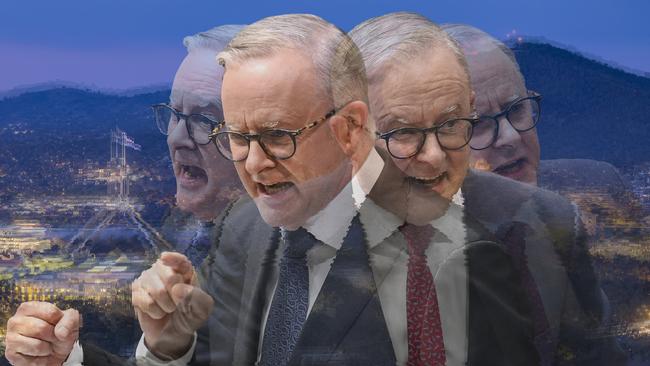
Labor’s complex identity as a progressive trade union-based political party drives these changes. Anthony Albanese failed on the voice but his government’s comeback is devastating – Labor champions personal income tax redistribution, regression to a more regulated, complex workplace relations system that priorities trade union power, the relentless march of renewables, and big-spending social agendas represented by the NDIS.
In the process the Albanese government has smashed its integrity credentials by abandoning all its stage three tax cut promises – a bold venture that has worked in the short term while Labor gives every sign it misjudges the damage that busted integrity will render during the next election campaign.
The power dynamics are stark. The trade unions have a huge vested interest in mobilising their numbers and finances to keep Labor in power. The business community suffers from political attrition at the hands of a government in total control as it manages corporate opposition or support according to Labor’s needs. And the federal parliament is shown to be left-progressive in alignment which means the government can legislate, as far as it desires, its re-charting of the nation’s direction.
The prospect of a likely Labor win in the Dunkley by-election will be significant – seen as an affirmation of Albanese’s post-voice policy and political assertion.
Meanwhile, the internal dynamics within a united government and a cabinet devoid of intellectual contest is fascinating: Treasurer Jim Chalmers finally got his way with the tax cuts; Albanese rediscovered his mojo but carries the burden of broken integrity all the way to the election vote; and Tony Burke and Chris Bowen are the political warriors determining the character and shaping the fate of the government in their policy portfolios.

Albanese had a road to Damascus moment over December-January. But how far does his new assertion extend? That is now the burning question. Does Albanese put the cue in the rack for a break or keep rolling? Labor is playing with fire – it is taking short-term electoral gains (with Newspoll showing Labor leading 52-48 per cent) but the economic balance long run is shifting against productivity, aspiration and meaningful, sustainable gains in living standards.
The moment of truth is coming for the opposition. Labor has put the Peter Dutton-led Coalition on notice. Dutton is expert at attacking Labor weaknesses. But the questions raised this week are what the Coalition stands for in terms of genuine policy. It needs answers, not just slogans, on the questions Labor is putting to the country – on income tax cuts, on its enterprise-sapping industrial relations experiment, its desperate quest to drive investment into renewables, and its out-of-control compassion agenda best exemplified by the NDIS.
Does the Dutton-led party have the nous and guts to re-create the Liberal Party brand? Dutton has been a success in uniting the party and calling the tactical shots. But the business end of the parliamentary term is coming.
Take industrial relations, where the Liberals have run dead for nearly 20 years since WorkChoices. If the Liberals cannot take a stand and draft a robust policy to negate Labor’s IR regression, then the party is exposed as intellectually weak and politically intimidated.
Yet many Liberals will be frightened, aware of the sheer propaganda Labor and the unions will mount, with their WorkChoices allusions, truckloads of money and political muscle. The message from weak-hearted Liberals will be: don’t fight on IR. That means full-scale surrender, consigning Australia to a workplace system unfit for a modern, technology-based 21st economy. It would also expose the Liberals as a party unfit to advance the values they are supposed to uphold.
Take income tax, where opposition Treasury spokesman Angus Taylor said the opposition will devise a tax package for the next election based on “lower, simpler, fairer” tax principles. That’s easier said than done. The opposition must uphold the elimination of “bracket creep” principles reflected in stage three but also show its equity credentials by offering some relief across much of the rate scale.
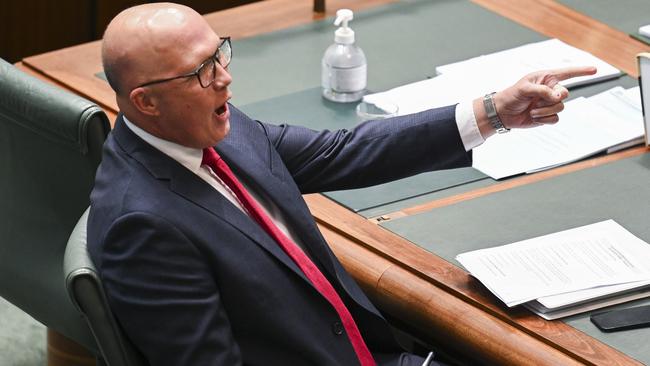
That’s big money. It comes only from a higher deficit or spending cuts (think NDIS, if they’re game). There is one certainty – the Coalition cannot just restore stage three and say that’s enough. Labor would tear them to pieces politically.
Dutton, as usual, got the tactics right this week. The opposition had no option but to vote for the tax cuts. Can you imagine the political insanity of voting them down? The government, no limit to its outrage, attacked Dutton for supporting its bill, claiming he was violating his principles and even sections of the media peddled this nonsense.
The politics of the left are now bitter, with the Greens seeking to steal renter class votes from Labor in a renewed push for action on negative gearing and the capital gains tax discount. Albanese and Chalmers have kept open their options on negatives gearing; it was Labor’s policy when Bill Shorten was leader. Taylor said of the Albanese government: “They are coming after negative gearing.” That’s what the Liberals want – they are fiercely opposed to changing either negative gearing or the capital gains tax discount.
Is Labor wedged between the Greens and the Coalition? If it refuses to act on property investment tax breaks, Labor exposes much of its constituency to a massive electoral assault from the Greens. If it does act, Labor is exposed to yet another broken promise and integrity attack from the Coalition – surely an unacceptable risk. The alternative would be to announce the scheme with a post-election start and seek an election mandate.
On IR, the warnings from the employer representatives this week deserve to be taken seriously. Innes Willox from the Australian Industry Group said: “Not a single additional job will be created by the workplace relations changes. They will not make workplaces more harmonious, give workers more job security, sustainably put extra money in worker’s pockets, make business more secure and productive or in any way support workplace innovation or skills development. Instead, they will undermine these objectives.
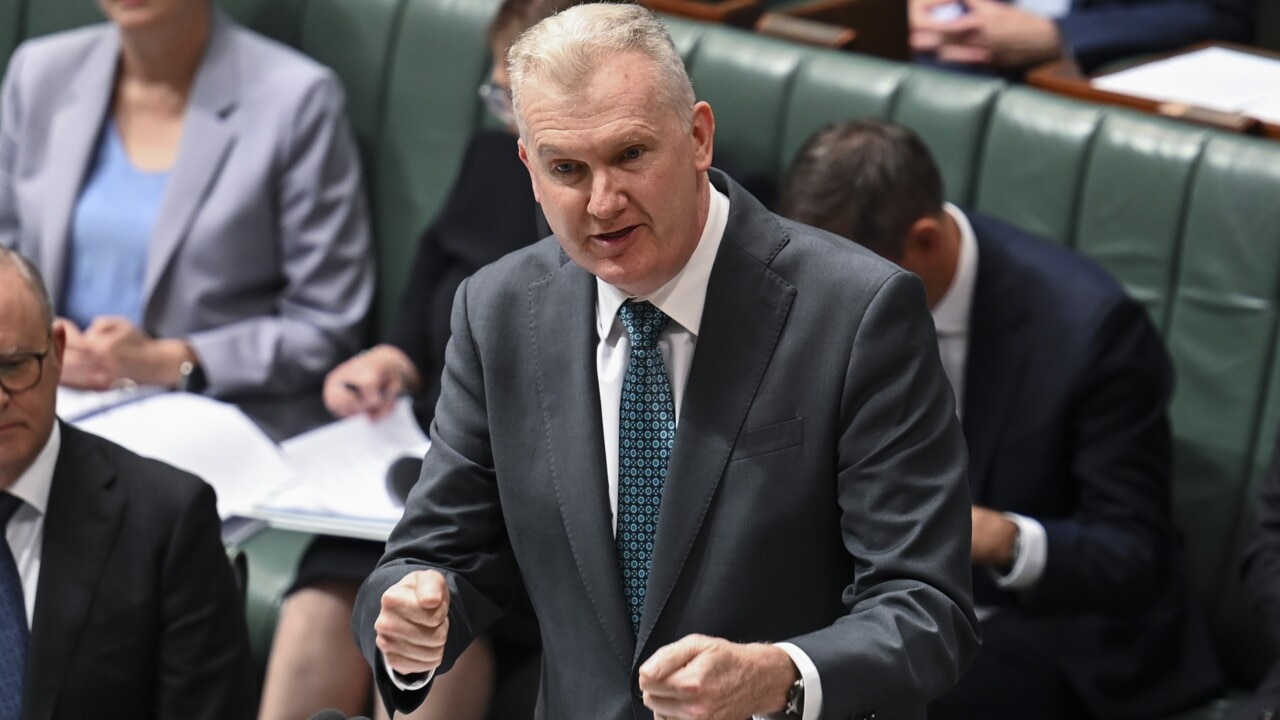
“The so called ‘right to disconnect’ laws are impractical and will simply add unwarranted conflict and uncertainty into our workplaces. The government’s all too eager adoption of the Greens’ changes to bargaining is a critical mistake that will undermine the efficacy of our bargaining system for years to come.”
These changes will be seen as a landmark in Labor’s evolution as a party. It marks the point at which Labor looked to the past, felt totally unable to move away from its industrial base and consigned itself to the dilemma of pretending to be a party of the technological future while tying itself to the workplace methods of the past. This is not just a mistake for Labor. It is a tragedy for Australia’s future prosperity.
On integrity, despite what is being said this week, Labor has given itself a daunting election inheritance. Can you imagine the response in an election campaign if Labor produces another tax package? Dutton will say: “They lied last time and they’re lying this time.” The entire integrity issue would be resurrected.
It is widely agreed Scott Morrison lost the 2022 election mainly on grounds of character; the issue now is whether Albanese will be ensnared in the same integrity trap.
Dutton will run on busted trust all the way to the next election – yet the rapidly emerging consensus among commentators is that Albanese’s tax redistribution is a winning tactic so far for a PM who has evidently rediscovered his mojo. Perhaps.
For Albanese, the integrity issue has just begun. A stark warning to Labor along these lines comes from ANU professor, Ian McAllister, one of the principals in the regular Australian Election Study and part author of an analytical study on leadership and integrity with Dr Sarah Cameron from Griffith University.
McAllister told Inquirer: “I think the current discourse – that people will favour Anthony Albanese because he’ll put money back in their pockets – really misses the point about how voters view leaders. Our research, as well as the international research, shows that leader integrity is a greater driver of how voters view their leaders than at any time in the past. Put simply, voters want leaders they can trust, and that desire has increased significantly over the period of our Australian Election Study surveys. The evidence, then, would suggest that Albanese – by no means a popular leader and someone voters felt ambivalent about in 2022 – may be seriously damaged by his broken promise.”
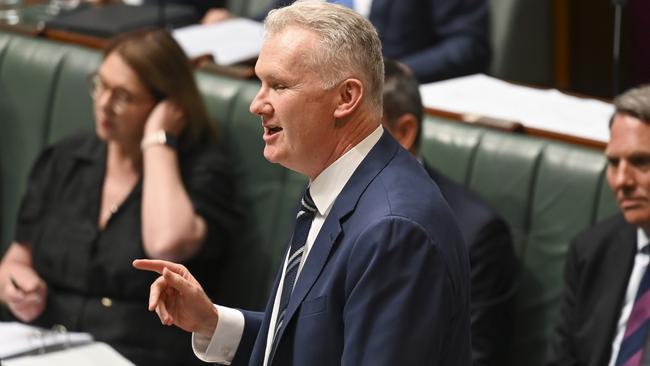
The irony is stark. Albanese’s assault on Morrison’s character was a brilliant tactic for the 2022 election. But does Labor fully grasp the forces it was dealing with? McAllister, in effect, points to a structural change in politics that goes to changed perceptions of national political leadership. The ANU 2022 election results survey found Morrison was “the least popular major party leader” in the history of election studies since 1987.
Critically, the report said the most important qualities in determining leader popularity were honesty and trustworthiness. This is where Albanese beat Morrison. The survey said “perceptions that Morrison was dishonest and untrustworthy” cost him disastrously.
The recent McAllister-Cameron survey goes further. Their study, The Decline of Political Leader Popularity, finds a “long-term” trend that leaders are becoming less popular, as support for the major parties also declines. The key finding, however, is that the leadership trait that is steadily becoming more important is integrity.
This is the prized quality; integrity is almost the make-or-break trait. That’s hardly a surprise given the overall crisis of trust in the political system. Dutton has announced to the world he will make Albanese’s integrity central to the next election.
“All this suggests to me that Labor may be harmed more than the current polls suggest by their broken promise on tax cuts,” McAllister said. “We’ve been asking leadership trait questions for a long time in our election studies. We find what motivates people to like and vote for a leader are the qualities of trustworthiness and competence. These are the qualities that matter. With Morrison, people had formed the view they didn’t regard him as being honest and trustworthy.
“What I observe with the tax cut turnaround is that Albanese is now framed by two things – the voice and the tax issue. The failure of the voice really speaks to competence since it’s pretty clear the referendum broke all the rules about how you would put a successful proposal. The tax change speaks to integrity or lack of it.
“These are the things that voters will remember about Albanese coming up to the next election – he lacked competence with the voice and he lacked integrity with the tax turnaround.”
Indeed, the ALP propaganda line – that the cuts are a tough and brave decision – merely highlights the broken promise. McAllister said that in the 2022 campaign, Albanese rated about the median in terms of Labor leaders: “It was pretty clear voters didn’t know much about him. They weren’t particularly positive, but they weren’t negative. They were sitting on the sidelines, waiting to see what he would actually do.”
Albanese has justified his broken promise as designed to help people with their cost-of-living crisis. But the benefit – only $16 a week at average weekly earnings – cannot remotely compensate for the combined loss of income from interest rate and income tax increases over the past 18 months.
McAllister said the political class misread the political impact of tax changes. Research had long since established that voters evaluate economic and tax policy “in terms of how it will affect the national economy” and this contrasts “to how it affects them personally” – what he calls egocentric voting.
He said: “Politicians seemed completely wedded to the idea of pocket-book voting. That’s what the current discussion is all about with a majority of voters benefiting because more money is going into their pockets. The assumption is this must be good. Of course, people are in favour of lower tax.
“However the research tells us that unless Labor can convince voters that the tax cuts are to the benefit of the national economy, it will leave voters unmoved. That was exactly the mistake Bill Shorten made in 2019 when his tax changes weren’t linked to how this would benefit the national economy.
“With the Albanese tax cuts, I would think by the time of the next election, particularly given this is a small amount of money, unless there’s some link with the national economic benefit, then what people will remember is the broken promise on tax and the lack of competence on the voice. They’re the key things.”




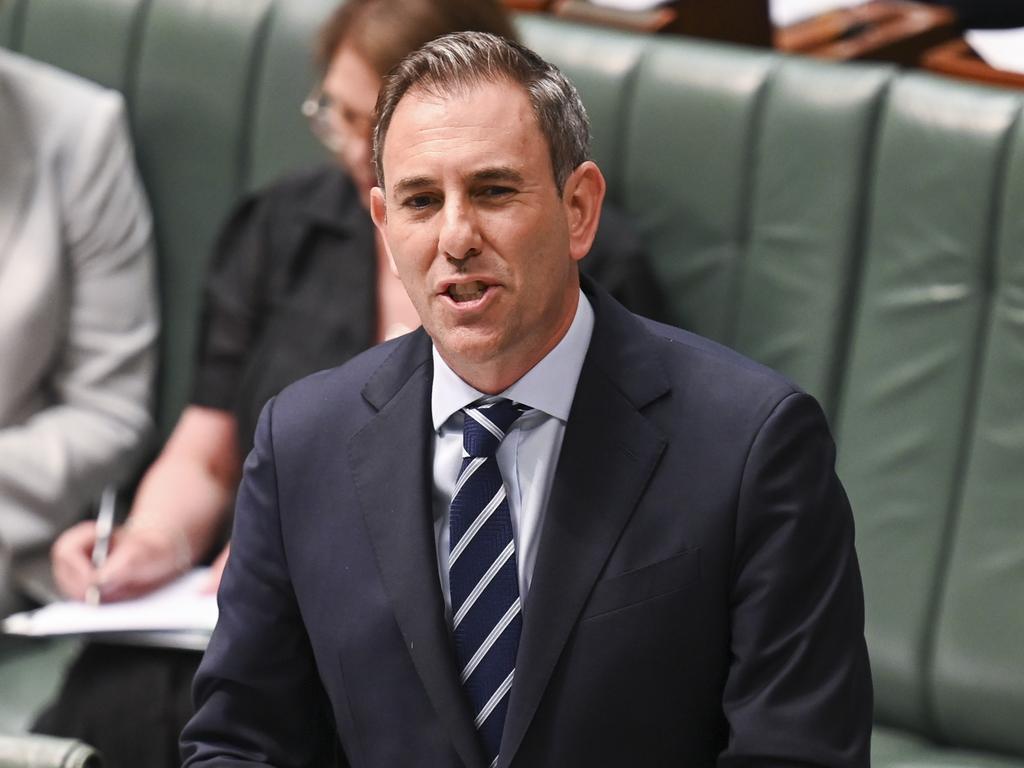
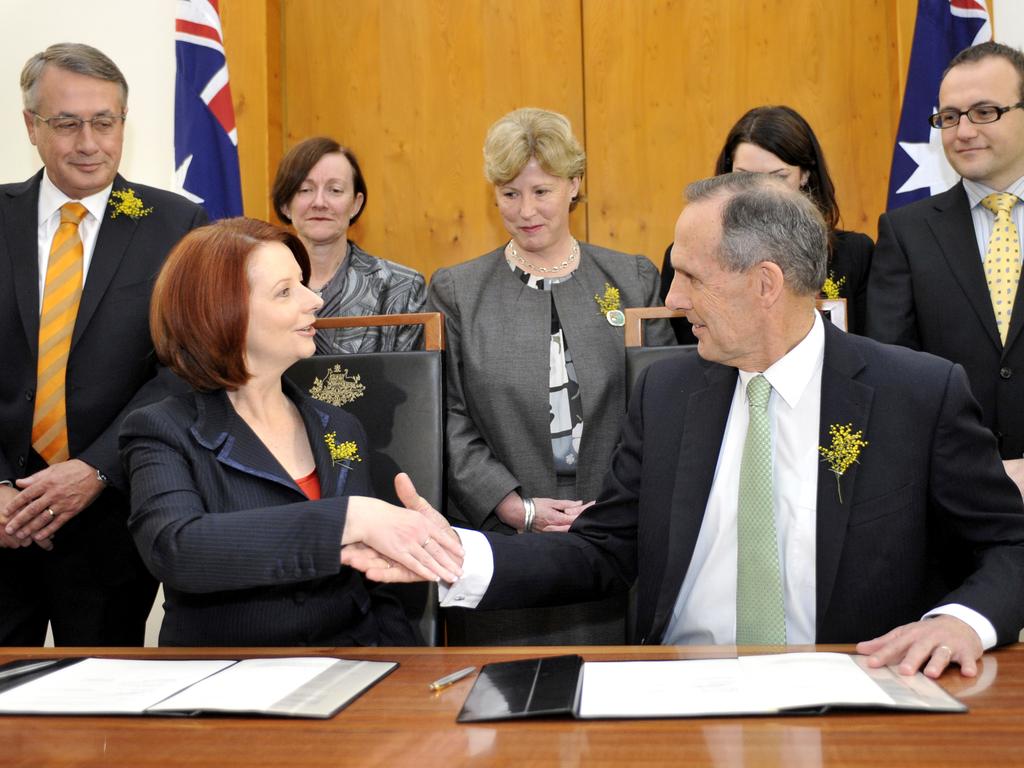


Australia is being decisively re-made. The Albanese government has stripped away its 2022 campaign veneer of reassurance to change the direction of the country. That is the blood ambition of new governments, the upshot being Labor is reigniting its base.